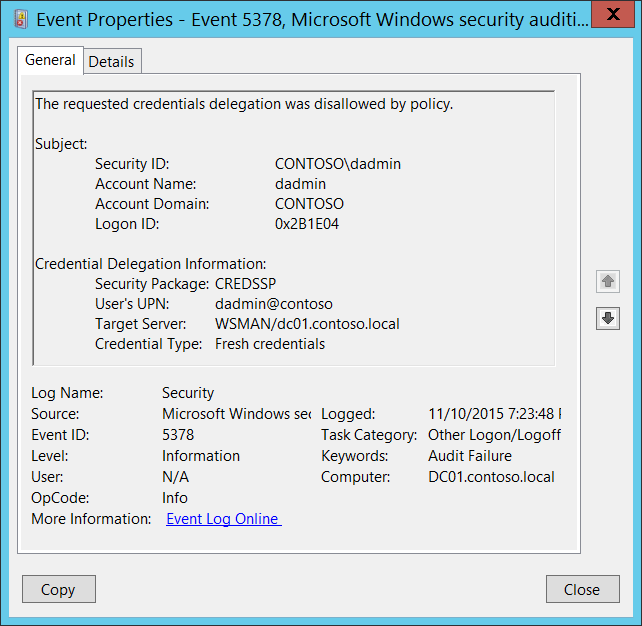5378(F): The requested credentials delegation was disallowed by policy.

Subcategory: Audit Other Logon/Logoff Events
Event Description:
This event generates requested CredSSP credentials delegation was disallowed by CredSSP delegation policy.
It typically occurs when CredSSP delegation for WinRM double-hop session was not set properly.
Note For recommendations, see Security Monitoring Recommendations for this event.
Event XML:
- <Event xmlns="http://schemas.microsoft.com/win/2004/08/events/event">
- <System>
<Provider Name="Microsoft-Windows-Security-Auditing" Guid="{54849625-5478-4994-A5BA-3E3B0328C30D}" />
<EventID>5378</EventID>
<Version>0</Version>
<Level>0</Level>
<Task>12551</Task>
<Opcode>0</Opcode>
<Keywords>0x8010000000000000</Keywords>
<TimeCreated SystemTime="2015-11-11T03:23:48.502346900Z" />
<EventRecordID>1198733</EventRecordID>
<Correlation />
<Execution ProcessID="500" ThreadID="4308" />
<Channel>Security</Channel>
<Computer>DC01.contoso.local</Computer>
<Security />
</System>
- <EventData>
<Data Name="SubjectUserSid">S-1-5-21-3457937927-2839227994-823803824-1104</Data>
<Data Name="SubjectUserName">dadmin</Data>
<Data Name="SubjectDomainName">CONTOSO</Data>
<Data Name="SubjectLogonId">0x2b1e04</Data>
<Data Name="Package">CREDSSP</Data>
<Data Name="UserUPN">dadmin@contoso</Data>
<Data Name="TargetServer">WSMAN/dc01.contoso.local</Data>
<Data Name="CredType">%%8098</Data>
</EventData>
</Event>
Required Server Roles: None.
Minimum OS Version: Windows Server 2008, Windows Vista.
Event Versions: 0.
Field Descriptions:
Subject:
- Security ID [Type = SID]: SID of account that requested credentials delegation. Event Viewer automatically tries to resolve SIDs and show the account name. If the SID cannot be resolved, you will see the source data in the event.
Note A security identifier (SID) is a unique value of variable length used to identify a trustee (security principal). Each account has a unique SID that is issued by an authority, such as an Active Directory domain controller, and stored in a security database. Each time a user logs on, the system retrieves the SID for that user from the database and places it in the access token for that user. The system uses the SID in the access token to identify the user in all subsequent interactions with Windows security. When a SID has been used as the unique identifier for a user or group, it cannot ever be used again to identify another user or group. For more information about SIDs, see Security identifiers.
Account Name [Type = UnicodeString]: the name of the account that requested credentials delegation.
Account Domain [Type = UnicodeString]: subject’s domain or computer name. Formats vary, and include the following:
Domain NETBIOS name example: CONTOSO
Lowercase full domain name: contoso.local
Uppercase full domain name: CONTOSO.LOCAL
For some well-known security principals, such as LOCAL SERVICE or ANONYMOUS LOGON, the value of this field is “NT AUTHORITY”.
For local user accounts, this field will contain the name of the computer or device that this account belongs to, for example: “Win81”.
Logon ID [Type = HexInt64]: hexadecimal value that can help you correlate this event with recent events that might contain the same Logon ID, for example, “4624: An account was successfully logged on.”
Credential Delegation Information:
Security Package [Type = UnicodeString]: the name of Security Package which was used. Always CREDSSP for this event.
User's UPN [Type = UnicodeString]: UPN of the account for which delegation was requested.
Target Server [Type = UnicodeString]: SPN of the target service for which delegation was requested.
Note Service Principal Name (SPN) is the name by which a client uniquely identifies an instance of a service. If you install multiple instances of a service on computers throughout a forest, each instance must have its own SPN. A given service instance can have multiple SPNs if there are multiple names that clients might use for authentication. For example, an SPN always includes the name of the host computer on which the service instance is running, so a service instance might register an SPN for each name or alias of its host.
- Credential Type [Type = UnicodeString]: types of credentials which were presented for delegation:
| Credentials Type | Description |
|---|---|
| Default credentials | The credentials obtained when the user first logs on to Windows. |
| Fresh credentials | The credentials that the user is prompted for when executing an application. |
| Saved credentials | The credentials that are saved using Credential Manager. |
Security Monitoring Recommendations
For 5378(F): The requested credentials delegation was disallowed by policy.
Important For this event, also see Appendix A: Security monitoring recommendations for many audit events.
If you have defined CredSSP delegation policy, then this event will show you policy violations. We recommend collecting these events and investigating every policy violation.
This event also can be used for CredSSP delegation troubleshooting.